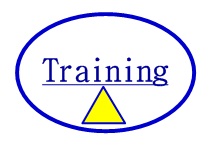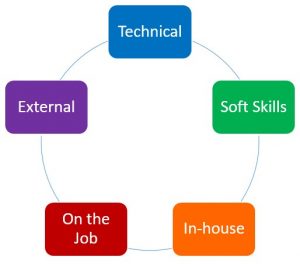Types of Business Training
Business training is a learning and development process which refers to the acquisition of specific skills, abilities, and knowledge to improve employee performance. Business training includes teaching new personnel to perform their job, introducing a new technology or procedures to existing staff, or helping an employee to achieve specific standards of proficiency in his or her job functions. It most often provided for a person’s present job activities and not future job functions, as may be the case with coaching and mentoring.
Business training is increasingly required to assist the workplace employees in using modern technologies, tools, techniques, strategies and materials in their jobs.
Training Programs and Activities
Business Training programs and activities refer to the acquisition of knowledge, skills, and competencies as a result of teaching job related skills, concepts, and information. Generally, training programs entail organized activity in which participants acquire information in order to help him or her attain a required level of knowledge or skill or improve his or her job performance. The goal of the program is to maintain, enhance and update knowledge or skills for workplace improvement.
The actual training typically involves the presentation of information as a means for enhancing skill development and improving workplace behaviors. Effective training programs convey relevant and useful information that inform participants and develop skills and behaviors that can be transferred back to the workplace.
Types of Business Training
The types of business training can differ depending on the training requirements, skills needed, work environment, and preferences. Training can be classified by type of skills learned, who presents the information, or where it is performed. We have provided an overview of some of the most commonly used types of training.
Technical skill training vs. Soft skill training
Technical skill training – This type of training involves teaching employees the necessary skills to accurately and effectively perform his or her job functions. Technical skills are often referred to as “hard skills.” These skills are job-specific as opposed to soft skills, which are transferable to other roles. Technical skills are typically easy to observe, quantify, and measure. Technical skill training can be fairly straightforward to design and deliver because most of the time the skill sets are brand new to the learner and no unlearning is needed. Technical training topics can include machine operation, technology applications, products, safety procedures, and sales techniques.
Soft skill training – This type of training involves teaching employees the interpersonal skills that will assist them in performing his or her job more effectively. Soft skills are personal attributes that enhance an individual’s ability to interact with others. Unlike technical or hard skills, which tend to be specific to a certain job function, soft skills are interpersonal, transferable, and broadly applicable across job roles and industries. Soft skills are often called “people skills” because they have to do with how people relate to each other. Topics include communicating, listening, giving feedback, solving problems, resolving conflict, making decisions, planning, delegating, coaching, and motivating. Unfortunately, soft skills are typically hard to observe, quantify, and/or measure.
In-house Training vs. External Training
In-house Training is when companies use their own resources (employee, material, rooms, etc…) to educate their employees. Training can be delivered by staff trainers, functional managers, or experienced employees.
External Training is when companies use of an outside firm to conduct the training. Trainers may come to the workplace or employees may travel to the seminars.
On the Job Training vs. Off the Job Training
On the job training is when the employee gets trained while he or she is performing his or her regular functions. This may be accomplished by having the employee watch a more experienced worker doing the job. However, this type of training may also include coaching, mentoring, special projects, or job rotation. With this type of training the employee is able to try out new skills in real situations.
Off-the-job training is when the employee is taken away from their jobs to be trained. The training is often in the form of a seminar, workshop, or conference. However, other forms are increasing in popularity including distance learning, self-study, computer-based training, or blended learning. Training can be done within the company’s premises or externally, at seminars run by specialist training groups.


